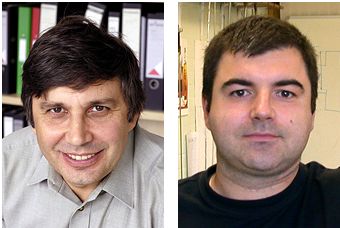Without question ultrathin carbon is here to stay and a lot of terrific work is done with it every month. Bendable computer screens and ultralight materials could all result from graphene research.
The University of Manchester researchers were born in Russia and started their individual physics work there but first worked together in Holland before moving to Britain, where they isolated graphene, a type of carbon one atom thick but more than 100 times stronger than steel, in 2004.
And they got their Nobel using Scotch tape, which has to make 3M happy. "If Scotch tape can pee off thin flakes of graphene from a piece of graphite and earn a Nobel prize, shouldn't you use it in your lab?" sounds like a terrific marketing campaign.
Geim, 51, is a Dutch national and Novoselov, 36, holds dual Russian and British citizenship. Novoselov is the youngest winner since 1973 and Geim said he had forgotten it was Nobel time when the prize committee called him.
"It has all the potential to change your life in the same way that plastics did," Geim told The Associated Press on Tuesday. "It is really exciting."

Andre Geim And Konstantin Novoselov. Credits: Geim, Sergeom, Wikimedia Commons and Novoselov, University of Manchester, UK
The Physics prize was the first mentioned by Alfred Nobel in his last will and testament creating the awards, likely because physics was regarded as the most prestigious at the time. In 1901 the very first Nobel Prize in Physics was awarded to Wilhelm Röntgen for his discovery of X-rays.
The Nobel Committee at the Royal Swedish Academy of Sciences is responsible for the selection of candidates from the names submitted for consideration by qualified nominators, who have been invited through formal letters. Committee members are elected for a period of 3 years from among the members of the Academy. In assessing the qualifications of the candidates, the Committee is assisted by specially appointed expert advisers; Ingemar Lundström (Chairman)
Professor of Applied Physics, Lars Bergström (Secretary), Professor of Theoretical Physics, Lars Brink (Member), Professor of Theoretical Particle Physics (Member), Anne L'Huillier (Member)
Professor of Atomic Physics, Börje Johansson (Member), Professor of Condensed Matter Physics, Björn Jonson (Member) Professor of Fundamental Physics.





Comments